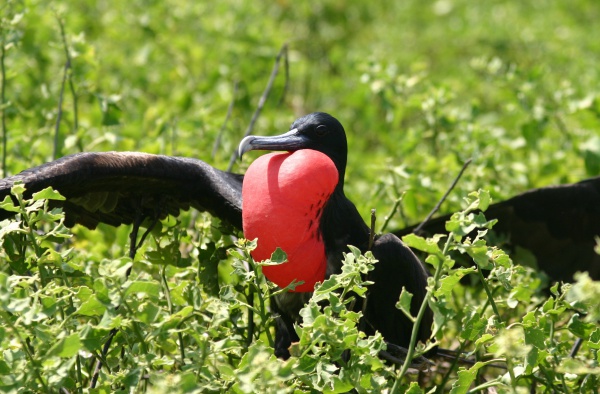Facts About Great frigatebird
The great frigatebird is a captivating seabird from the frigatebird family, predominantly inhabiting the tropical Pacific and Indian Oceans, with a smaller population residing in the South Atlantic. One of the most striking features of these birds is the pronounced sexual dimorphism. Females are larger and have white throats and breasts, while males exhibit a striking purple-green sheen on their scapular feathers. During the breeding season, males inflate a vivid red gular sac to attract females.
Great frigatebirds primarily feed on flying fish, which they catch in mid-air just above the ocean's surface. Unlike some of their relatives, they don't heavily depend on kleptoparasitism, though they do occasionally steal food from other birds.
Classified under the genus Fregata and family Fregatidae, there are five recognized subspecies of great frigatebirds. These birds are widely distributed across tropical seas worldwide, with Hawaii marking the northernmost part of their range in the Pacific. They are known for their regular migrations and strong tendency to return to their birthplace to breed, even after visiting other colonies.
Great frigatebirds forage in pelagic waters near their nesting sites, primarily targeting flying fish. They also prey on seabird chicks and sometimes engage in food theft, but this does not constitute a significant portion of their diet. Their breeding season can extend up to two years, and they nest in colonies, constructing their nests in bushes and trees. The males' courtship display, featuring the inflation of their red gular sac, is particularly remarkable.
Parental care in this species is extensive. Chicks take several months to fledge and continue to receive parental care long after leaving the nest. Great frigatebirds reach sexual maturity after several years and typically enjoy a long lifespan. Despite facing regional challenges, the species is listed as Least Concern by the IUCN, thanks to its large population and broad distribution.
In the South Atlantic, the subspecies F. m. nicolli is critically endangered in Brazil. Conservation efforts, including eradication programs, have been implemented to help protect this subspecies. Great frigatebird populations on islands like Saint Helena and Trindade have encountered significant challenges, such as habitat destruction and the introduction of invasive species, leading to their decline in these areas.

 Canada
Canada